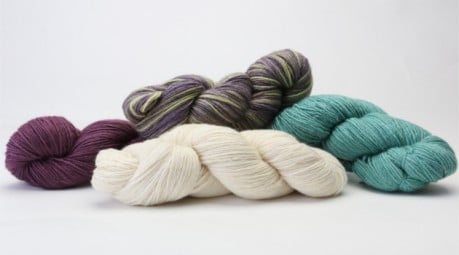If you've ever wanted to know more about hand dyed yarns, then we've got you covered! We explain techniques, terminology, and how you can expect these gorgeous artisan fibres to knit or crochet up.
Hand dyed yarns have taken the knitting and crochet communities by storm! Yarn enthusiasts are loving the handcrafted nature of these fibres and the unique effects that they can offer, and how the hand dyed yarn community is eco-friendly and frequently uses sustainable fibre from organic farms.
Variegated like Manos Alegria
The most popular of hand dyed techniques is variegated yarn; dyed with several different colours for a vivid, exciting effect. These yarns knit and crochet up differently depending on the length of the row or round, the type of stitch, and your gauge or tension. These can create "pooling", which is when the same part of the skein stacks on top of itself to create spodges of the same colour. While some knitters and crocheters like the pooling effect, some do not and adjust their stitches to avoid it.
Multi -tonal or semi solid, like Manos Franca
While semi solid yarns can be dyed in a few different ways, the results are always stunning. Multi-tonal, or semi-solid, is a term used to describe yarns that are dyed with the same shade in different intensities, or very closely related shades to create a beautiful yet subtle finished piece of fabric. These yarns are in high demand for larger projects like garments or popular wrap style shawls.
Hand Painted, like Manos Silk Blend DK
Hand painted yarns are the most labor intensive of the hand dyeing techniques; these yarns are tended to skein by skein, with the artisans dyeing each one. These yarns can have self-striping or variegated effects when knitted or crocheted up, and no two skeins are perfectly alike. If you are hoping for a more uniform look, you can switch skeins every couple of rows to maintain a more even colour.

Kettle dyed, like Manos Marina
Kettle dyed yarns are fabulous for garments, with their gentle tonal shifts throughout the skein. These yarns aren't as flashy as some other hand dyed techniques, but that just makes them better for larger projects. In many cases, kettle dyed yarns are dyed slowly over the span of a whole day (sometimes more!), while the dyers slowly add dye to the kettle and allow it to bond to the fibre.










